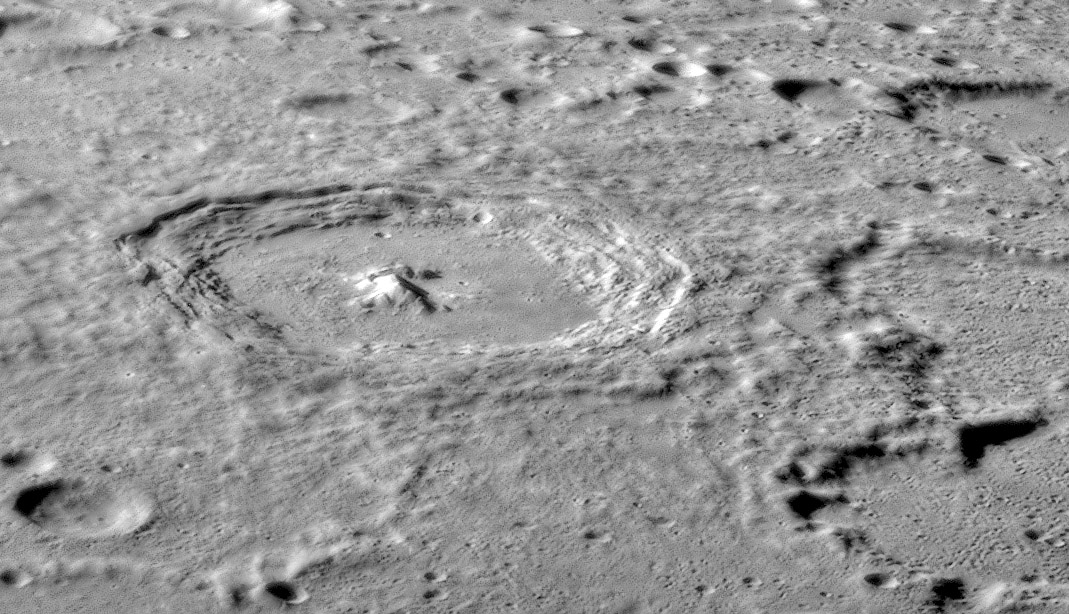Difference between revisions of "November 13, 2013"
| Line 3: | Line 3: | ||
<!-- ws:start:WikiTextHeadingRule:0:<h1> --> | <!-- ws:start:WikiTextHeadingRule:0:<h1> --> | ||
<!-- ws:start:WikiTextLocalImageRule:6:<img src="/file/view/LPOD-Nov13-13.jpg/468527180/LPOD-Nov13-13.jpg" alt="" title="" /> -->[[File:LPOD-Nov13-13.jpg|LPOD-Nov13-13.jpg]]<!-- ws:end:WikiTextLocalImageRule:6 --><br /> | <!-- ws:start:WikiTextLocalImageRule:6:<img src="/file/view/LPOD-Nov13-13.jpg/468527180/LPOD-Nov13-13.jpg" alt="" title="" /> -->[[File:LPOD-Nov13-13.jpg|LPOD-Nov13-13.jpg]]<!-- ws:end:WikiTextLocalImageRule:6 --><br /> | ||
| − | <em>image by [mailto:mwirths@starband.net | + | <em>image by [mailto:mwirths@starband.net Michael Wirths], Baja California, Mexico</em><br /> |
<br /> | <br /> | ||
| − | Pythagoras is a Copernicus look-alike seen from a high oblique perspective. It has a broad, flat floor, partly covered with slightly darkish impact melt on the right (which has been gardened so that the original surface is subdued in the LRO QuickMap [http://bit.ly/1fA3W1f | + | Pythagoras is a Copernicus look-alike seen from a high oblique perspective. It has a broad, flat floor, partly covered with slightly darkish impact melt on the right (which has been gardened so that the original surface is subdued in the LRO QuickMap [http://bit.ly/1fA3W1f view]), but the smooth-topped ponds of melt thrown out to the north/right side are nicely captured in Mike's image with a new camera, The debris on the left side of the floor may have come from the large area of the left wall that collapsed, replacing terraces with an unstructured mound of rubble - see the QuickMap again. The massive slump of this piece of the left rim may have sloshed the impact melt ponded on the crater floor up and over the rim of the right side. Or perhaps Pythagoras formed by a projectile coming in low from the left, and the melt outside the crater wall was never on its floor but was ejected downrange where is fell and collected in low spots. On a high Sun terrestrial [http://www.lpi.usra.edu/resources/cla/images/lores/aiii.jpg photo] Pythagoras does not appear to have rays - presumably it is too old and the original ones have been eroded away - robbing us of the opportunity to test the oblique impact idea by looking for a zone of avoidance. <br /> |
<br /> | <br /> | ||
| − | <em>[mailto:tychocrater@yahoo.com | + | <em>[mailto:tychocrater@yahoo.com Chuck Wood]</em><br /> |
<br /> | <br /> | ||
<strong>Technical Details</strong><br /> | <strong>Technical Details</strong><br /> | ||
| Line 14: | Line 14: | ||
<strong>Related Links</strong><br /> | <strong>Related Links</strong><br /> | ||
<em>[http://lpod.wikispaces.com/21st+Century+Atlas+of+the+Moon 21st Century Atlas]</em> chart 20.<br /> | <em>[http://lpod.wikispaces.com/21st+Century+Atlas+of+the+Moon 21st Century Atlas]</em> chart 20.<br /> | ||
| − | Mike's bed and breakfast astronomy [http://www.bajadarkskies.com | + | Mike's bed and breakfast astronomy [http://www.bajadarkskies.com website]<br /> |
<br /> | <br /> | ||
<hr /> | <hr /> | ||
Revision as of 18:12, 11 January 2015
Rearranging Impact Melt

image by Michael Wirths, Baja California, Mexico
Pythagoras is a Copernicus look-alike seen from a high oblique perspective. It has a broad, flat floor, partly covered with slightly darkish impact melt on the right (which has been gardened so that the original surface is subdued in the LRO QuickMap view), but the smooth-topped ponds of melt thrown out to the north/right side are nicely captured in Mike's image with a new camera, The debris on the left side of the floor may have come from the large area of the left wall that collapsed, replacing terraces with an unstructured mound of rubble - see the QuickMap again. The massive slump of this piece of the left rim may have sloshed the impact melt ponded on the crater floor up and over the rim of the right side. Or perhaps Pythagoras formed by a projectile coming in low from the left, and the melt outside the crater wall was never on its floor but was ejected downrange where is fell and collected in low spots. On a high Sun terrestrial photo Pythagoras does not appear to have rays - presumably it is too old and the original ones have been eroded away - robbing us of the opportunity to test the oblique impact idea by looking for a zone of avoidance.
Chuck Wood
Technical Details
18" Starmaster and a 3X's Ziess Abbe barlow + PGR Grasshopper 3 camera.
Related Links
21st Century Atlas chart 20.
Mike's bed and breakfast astronomy website



